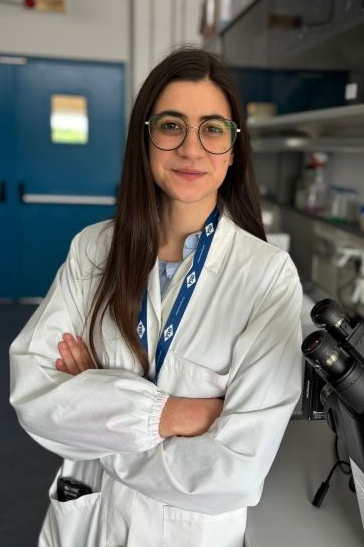
ORCID ID: 0009-0006-4982-7182
Curriculum: Experimental Neuroscience
Tutor: Professor Angela Bentivegna
Supervisor: Dr Serena Redaelli
Workplace: University of Milano-Bicocca, School of Medicine and Surgery, U8 – ASCLEPIO, Via Cadore 48, Monza
I’m Ghizzi Martina, I was born in Casalmaggiore (CR) in 1998.
I attended classical high school at G.Romani institute, where I graduated in 2017.
From 2017 I attended the University of Ferrara at the Department of Life Sciences and Biotechnology. I graduated in 2020 in Biotechnology with a thesis entitled “Process of entry into the cell of SARS-CoV-2 and search for an inhibitor to block viral pathogenesis”, under the supervision of professor Silvia Sabbioni.
From 2020 I attended the University of Milano-Bicocca at the department of Medicine and Surgery and I did my thesis intership in professor Bentivegna’s laboratory. I graduated in 2023 in Medical Biotechnologies with thesis entitled “Setting up of liquid biopsy in high-grade Gliomas: research of circulating biomarkers for diagnosis and monitoring of the disease” under the supervision of professors Angela Bentivegna and Francesca Raimondo.
After my master’s degree I received a fellowship granted by professor Marialuisa Lavitrano for a project entitled “Study of integrated diagnostic methodologies in the oncological field”.
Since November 2024 I have started my PhD in Experimental Neuroscience with a project entitled “Exploring Glioblastoma heterogeneity: the impact of ecDNA on tumor evolution and progression”.
PhD research project
Exploring glioblastoma heterogeneity: the impact of ecDNA on tumoral evolution and progression
Glioblastoma is the most common and malignant primary brain tumor in adults, characterized by an extremely poor prognosis. Currently, standard treatments involve surgical resection followed by combined radiotherapy and chemotherapy with the alkylating agent Temozolomide, but they show limited efficacy and 70% of patients relapse within a year with an average survival of only 12-15 months after diagnosis. This is due to the extreme heterogeneity of this type of tumor, which primarly reflects the coexistance in the tumor core of different cell subpopulations, including the Glioma Stem Cells (GSCs) that are the responsible for therapy resistance.
Recent researches have shown that extrachromosomal circular DNA (eccDNA), that carry amplifications of oncogenes related to GBM development and proliferation, such as EGFR, is one of the main factor of tumor heterogeneity. It is a double-stranded DNA molecule of 1-3 Mb detected outside the chromosome, which can be found in nucleus or in cytoplasm, in the form of double minutes (DMs) or single element.
The aims of my PhD project are to investigate the presence of eccDNA carrying amplifications of oncogenes in GSCs isolated and in patients’ tumor biopsies from which GSCs derived through cytogenetic techniques. Then, I will analyse potential changes in eccDNA due to cellular stress, for example hypoxia, pharmacological treatments or thermal variations. In the last part I will verify the presence of amplifications of oncogenes in extracellular vesicles (EVs) derived from conditioned culture medium of GSCs and from plasma of patients. I will also analyse if eccDNA can be found as “cell-free” DNA in plasma samples collected from GBM patients at different timepoints (preoperative, postoperative, three-six-nine months post surgery). This could open the way to an approach of liquid biopsy, considering eccDNA a possible biomarker useful for GBM diagnosis, prognosis and monitoring of clinical treatment.